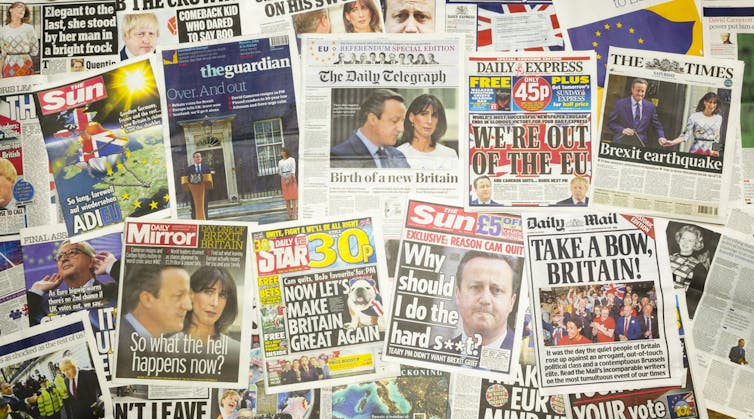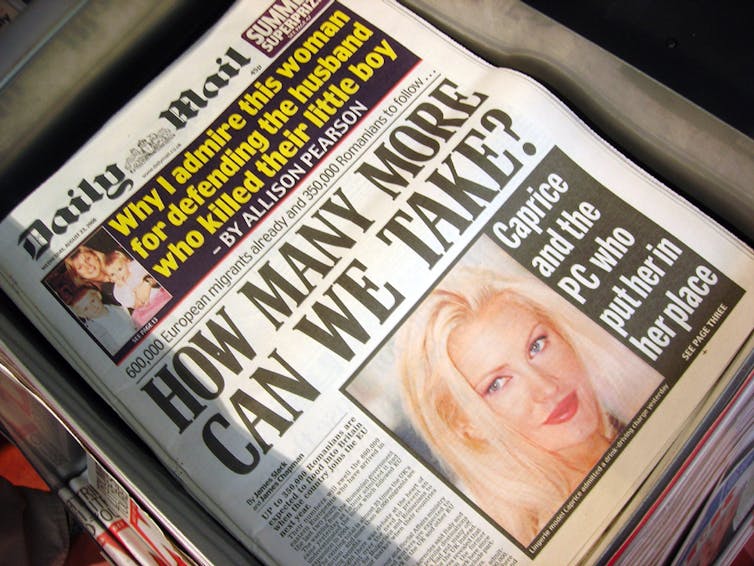
Denny Pencheva, University of Bristol
Immigration anxieties played a significant role in British people’s decision in June 2016 to vote to leave the EU. This has fuelled a debate over the quality of media reporting on migration issues.
In order to get a better idea of the role the media played, we examined nearly 1,000 news items, feature articles and editorials from six UK newspapers: the Daily Mail, Daily Mirror, the Sun, the Times, the Daily Telegraph and the Guardian, published in 2006 and in 2013.
These were politically important years: 2006 was the year before Bulgaria and Romania joined the EU and the time when it was becoming clear that migration forecasts for the countries that joined the EU in 2004 had been way off. In 2013 David Cameron, delivered his Bloomberg speech in which he promised the EU referendum.
One thing that quickly became apparent was that media coverage contained a selective mixture of statistics, reported comments from politicians and other public figures, academic studies, think-tank reports, and emotive polemics backed with no evidence at all. The practice of mentioning evidence in passing and then dismissing or overriding it was also present.
Bolt the door
The most prominent theme was that mobility within the EU damages British sovereignty. Newspapers from across the political spectrum suggested that intra-EU mobility was impossible to control and that the free movement principle overrides British sovereignty. The theme was also marked by growing scepticism towards migration data and evidence.
The language used to describe EU migration tended to emphasise quantity and scale (“mass”, “vast”, “large scale”). There were lots of “floods” and “waves” and extensive use of military metaphors (“army”, “war”, “battle”, “siege” or “hordes”) in the tabloid press.
When covering migration from Bulgaria and Romania, the press regularly trotted out the figure of 29m migrants – which, in fact, is the combined population of the two countries. Rather than reporting on actual migration of Bulgarians and Romanians, papers preferred hypothetical scenarios where they would migrate en masse simply because they could.
An opinion piece from the Sun, dated September 22 2006, claimed that “any Bulgarian or Romanian will be free to come here as they please – and come they will, because their own countries are very poor and there is no work”.

Gideon via Flickr, CC BY-SA
Overall, the Guardian did a better job than the other papers when it came to using evidence. An article from 2013 used statistics form the Department of Work and Pensions to reveal that immigration to Britain from southern European member states had increased by 50% while using national insurance registrations to show that “data shows little evidence of any surge in Romanians or Bulgarians arriving”.
One article in the Sun covered the story from a different angle, arguing that because of the negative impact of the financial crisis on the building trade in Italy and Spain, migrant workers were bound to be laid off and flood into Britain. The article was centred on an interview with “jobless William Razval, 24” – who, it said, “is desperate to lead the exodus”.
Benefits scroungers
The topic of EU nationals abusing the welfare system was the second most popular theme. Despite official figures, newspapers often chose to ignore evidence and play on public fears that welfare abuse was all but inevitable.
Compare & Contrast: Front page story vs Tiny pg 4 correction #IPSOfail #DailyExpress #LevesonNow #migrants pic.twitter.com/bCiNMI5r8u
— Hacked Off (@hackinginquiry) September 11, 2015
The press trotted out crude decontextualised comparisons between living standards in Britain and eastern Europe. Once again, newspapers focused on the hypothetical possibility of welfare abuse, rather than on specific instances where it has actually taking place. In 2006, Tony Parsons, then a columnist with the Daily Mirror, asked: “At what point does mass immigration, even if it’s good for the economy, push our social services to breaking point?”
Nothing much had changed by March 2013, when a news article from the Times quoted Iain Duncan Smith, who claimed that it was “too easy for EU migrants to claim access to social housing, health care and tax credits” without providing any evidence as to show how many were actually doing so. In June of the same year, the Daily Mail sounded a familiar dog whistle, claiming: “It is easy to imagine how a public fed up with abuses of the welfare state would react.”
Here’s the Daily Mail Online having to correct its lie that the #NHS was at breaking point because of EU immigration #StopBrexit #Brexit pic.twitter.com/lOgPs3r0a5
— Nick Reeves #FinalSayForAll #FBPE (@nickreeves9876) July 6, 2017
In light of recent arguments that journalists become increasing proactive in framing and reshaping migration debates instead of being content with reporting them, it is important to assess the relationship between news coverage and evidence. After all, anti-immigration, eurosceptic reporting did much of the grunt work for the Leave camp and put immigration anxieties in the centre of Brexit discussions and negotiations.
Now we are faced with the danger of race-to-the-bottom post-Brexit immigration policies where EU citizens could be downgraded to migrants overnight on the basis of unsupported anxieties and wild speculations.![]()
Denny Pencheva, Associate Teacher, UK and EU migration policies; Assistant Teacher, Comparative Politics, University of Bristol
This article is republished from The Conversation under a Creative Commons license. Read the original article.
